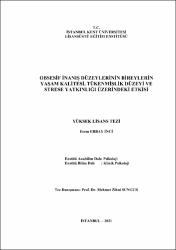Obsesif inanış düzeylerinin bireylerin yaşam kalitesi, tükenmişlik düzeyi ve strese yatkınlığı üzerindeki etkisi
Citation
Erbay İnci, E. (2021). Obsesif inanış düzeylerinin bireylerin yaşam kalitesi, tükenmişlik düzeyi ve strese yatkınlığı üzerindeki etkisi. Yayımlanmış yüksek lisans tezi, İstanbul Kent Üniversitesi, İstanbul.Abstract
Bu çalışmada; obsesif inanışların yaşam kalitesi, tükenmişlik düzeyi, strese yatkınlığı
üzerindeki etkisi, bu değişkenlerin birbiri ile olan ilişkileri ve sosyo-demografik
özelliklere göre farklılaşması incelenmiştir. Araştırmanın örneklemini 411 yetişkin
birey oluşturmaktadır. Araştırmada veri toplamak amacıyla; Sosyo-Demografik Bilgi
Formu, Obsesif İnanışlar Ölçeği-44 (OİÖ-44), Dünya Sağlık Örgütü Yaşam Kalitesi
Ölçeği Kısa Form, Maslach Tükenmişlik Ölçeği ve Strese Yatkınlık Ölçeği
kullanılmıştır. Katılımcılara uygulanan ölçeklerden elde edilen veriler SPSS-22 (Statistical
Package For Social Sciences) istatistik paket programı kullanılarak analiz edilmiştir.
Kullanılan analizler Pearson Korelasyon analizi, Çoklu Regresyon analizi, Bağımsız
Gruplar T Testi, Tek Yönlü ANOVA analizi ve Tukey analizi kullanılmıştır. Araştırmanın
bulgusuna göre; katılımcıların obsesif inanışları ile yaşam kaliteleri arasında anlamlı bir
ilişki olmadığı tespit edilmiştir. Katılımcıların obsesif inanışlar toplam puanı ile
sorumluluk/tehdit algısı ve mükemmeliyetçilik/kesinlik boyutlarının tükenmişlik düzeyi
ile pozitif yönlü ilişkili olduğu sonucuna varılmıştır. Obsesif inanışların tükenmişlik
düzeyi üzerindeki etkisi incelendiğinde, obsesif inanışlar toplam puanı ile
sorumluluk/tehdit algısı ve mükemmeliyetçilik/kesinlik boyutlarının hem model olarak
hem de özgün olarak tükenmişlik düzeyini yordadığı sonucuna ulaşılmıştır.
Katılımcıların obsesif inanışlar ile strese yatkınlık düzeyi arasındaki ilişki
incelendiğinde, obsesif inanışlar toplam puanı ile sorumluluk/tehdit algısı,
mükemmeliyetçilik/kesinlik ve düşünceleri kontrol etme boyutlarının strese yatkınlık
düzeyi ile pozitif yönlü ilişkili olduğu sonucuna varılmıştır. Obsesif inanışların strese
yatkınlık düzeyi üzerindeki etkisi incelendiğinde, obsesif inanışlar ve alt boyutların bir
bütün olarak strese yatkınlık düzeyini yordadığı sonucuna ulaşılmıştır. Bağımsız
değişkenlerin strese yatkınlık üzerindeki özgün etkisi incelendiğinde, obsesif inanışlar
toplam puanı ile sorumluluk/tehdit algısı ve boyutunun bağımsız olarak strese yatkınlık
düzeyini etkilediği; mükemmeliyetçilik/kesinlik ve düşünceleri kontrol etme
boyutlarının bağımsız olarak strese yatkınlık düzeyini etkilemediği belirlenmiştir. In this study, predictive power of obsessive beliefs on quality of life, burnout level and
stress vulnerability, relationships of these variables with each other and their differentiation
according to socio-demographic characteristics were investigated. Sampling of this study
consisted of 411 adults. In order to collect data; Socio- Demographic Information Form,
Obsessive Beliefs Questionnaire-44 (QBQ-44), World Health Organisation Quality of
Life Scale-Short Form, Maslach Burnout Inventory and Stress Vulnerability Scale. Data
obtained from the scales applied to the participants were analyzed using the SPSS-22
(Statistical Package for Social Sciences) statistical package program. The analyzes used
were Pearson Correlation analysis, multidirectional regression analysis, Independent
Groups T Test, One-Way ANOVA analysis and Tukey analysis. According to the analysis,
it was determined that there was no significant relationship between the obsessive beliefs of
the participants and their quality of life. It was concluded that the total score of the
participants' obsessive beliefs, the perception of responsibility/threat, and the dimensions of
perfectionism/certainty were positively related to the level of burnout. When the effect of
obsessive beliefs on the level of burnout was examined, it was concluded that the total score
of obsessive beliefs and the dimensions of responsibility/threat perception and
perfectionism/certainty predicted the level of burnout both as a model and specifically.
When the relationship between the obsessive beliefs of the participants and the level of
vulnerability to stress was examined, it was concluded that the total score of obsessive
beliefs and the dimensions of responsibility/threat perception, perfectionism/certainty and
controlling thoughts were positively related to the level of vulnerability to stress. When the
effect of obsessive beliefs on the level of vulnerability to stress was examined, it was
concluded that obsessive beliefs and sub-dimensions predicted the level of susceptibility to
stress as a whole. When the specific effect of independent variables on susceptibility to
stress was examined, it was found that the total score of obsessive beliefs and the perception
of responsibility/threat and its size independently affected the level of susceptibility to
stress; It was determined that the dimensions of perfectionism/certainty and controlling
thoughts independently did not affect the level of vulnerability to stress.


















